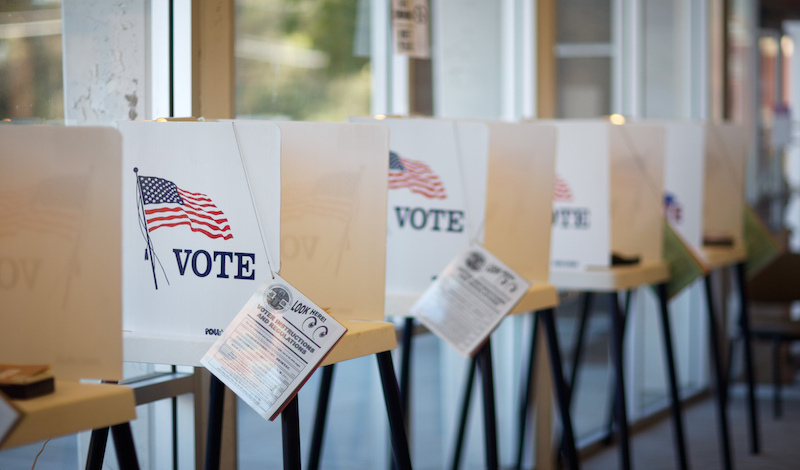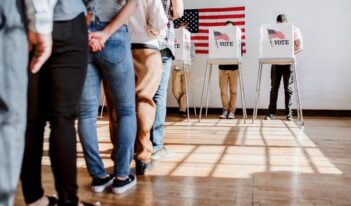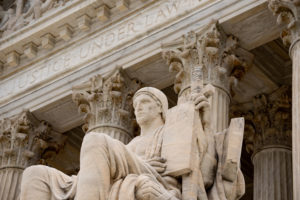
Democrats should accept voter ID in exchange for Republican support of national voting standards.
When it comes to voting rights in America, the time has come for a Faustian bargain.
Democrats should accept voter IDs but, in return, Republicans must agree to the creation of national standards and a national election commission to regulate federal elections. This may be the only way to break the impasse on voting rights and administration and protect universal franchise.
In Bush v. Gore, the U.S. Supreme Court declared that “the right to vote is protected in more than the initial allocation of the franchise.” What happens after that initial allocation, such as the counting of votes or the drawing of district lines, can debase voting rights as much as outright denial of the right to vote.
Although the original U.S. Constitution was silent on voting rights, the United States has deployed constitutional amendments, legislation, and court decisions throughout its 245-year history to create near-universal adult franchise for those ages eighteen and above.
Despite this arc of universal franchise, many eligible voters in America still do not vote. For some, that may reflect a deliberate choice. For others, state laws have historically made voting difficult. This is especially true for people of color who have historically faced literacy tests, poll taxes, and even outright physical threats if they tried to vote.
The Voting Rights Act of 1965 and its subsequent amendments dramatically made inroads into erasing discrimination at the polls. Yet subsequent Supreme Court decisions, both in Shelby County v. Holder and Brnovich v. Democratic National Committee, have undermined the Act, leading to a recent wave of state efforts to restrict voting rights, especially those controlled by the Republican Party.
The United States is a polarized country. This polarization extends to many issues, including voting rights. Currently, Congress is deadlocked over legislation to regulate voting rights, which includes provisions to overturn Shelby County and Brnovich.
Republicans believe there is widespread voter fraud in America and that legislation is needed to prevent it. After the 2020 election, this belief has only grown, as claims of a stolen election have prompted states across the country to pass new and often restrictive voting legislation. Many Democrats discount the presence of voter fraud, arguing that such claims are false and that the real aim of new voting regulations is to stifle the vote.
Even though evidence supports the position of Democrats that voter fraud is rare, this is immaterial. Public opinion supports requiring voter IDs and other efforts to address fraud. But the public also supports other options, such as mail-in and early voting. Although there is no evidence the public rejects universal adult franchise, many states have been historically unfriendly and unsupportive of protecting or expanding voting rights.
The national government must enter the game. In the past, only when the federal government has acted to regulate or intervene have voting rights been protected.
While recently proposed legislation, such as For the People Act of 2021, aims to establish some federal standards when it comes to voting, current proposals fail to account for the need for federal regulation in the operation of elections. Current proposals would still provide states with the primary authority to regulate federal elections with no guarantee of success, since the right to vote would still be subject to the vagaries of state officials who could undermine local election administration.
The United States needs a grand voting rights bargain where both sides give up something significant in exchange for something they want. Democrats should accept the reality of voter identification as Republicans demand. Distributing voter IDs, however, should not be up to the states. It should take place through a national identification system, just as has been adopted by other countries. This system should issue voter identification cards at no cost, make them universally available at age eighteen, and require them at the polls to verify voting.
In return, Republicans should accept national uniform standards when it comes to federal elections. These standards should include common rules on voter eligibility, early voting and voting by mail, and the location of polling stations. The United States also needs a central election commission, just as other countries have, which would oversee and administer federal elections. Such a body would have rulemaking and other regulatory authority to oversee elections.
National standards and a centralized regulatory body would provide many benefits. They would presumably eliminate the disparity in voting standards and regulations across the country. They could arguably decrease litigation against states, reduce election costs, improve turnout, and facilitate the ability of people to move within and across states and remain eligible to vote. In addition, a centralized commission could serve as an arbiter of federal election disputes, subject to oversight by Congress exercising its constitutional authority to regulate disputes over federal elections and state electoral votes in national contests.
National standards and regulation of voting in federal elections could address concerns about both voter fraud and turnout so that both Republicans and Democrats get what they want while also improving the quality and regulation of federal voting rights.
This essay is part of a seven-part series, entitled Regulating Elections in the United States.




